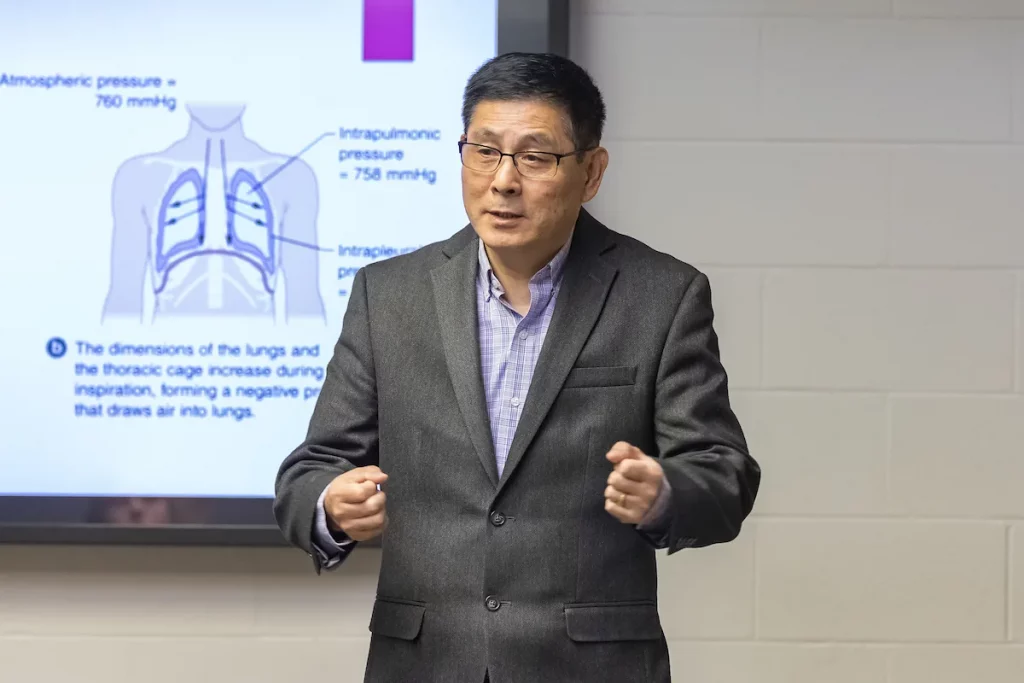Preparing Students to Create a Fitter Future
Starting in the fall of 2023, Valparaiso University’s kinesiology program, formerly part of the College of Business, has been split into two divergent majors: sports management (which is remaining in the College of Business) and exercise science, which has found a new home with the College of Nursing and Health Professions. According to Peixing Jiang, Ed.D., director of the new program and associate professor of exercise science, the split will better serve individual students’ specific needs and interests.
“Kinesiology is a very broad concept,” says Professor Jiang. “You can have sports management, physical education, exercise science, recreation, all under that subject. It was too extreme, too many different subjects. Sports management and exercise science fall under the same subject but don’t have a lot of overlapping content.”
Exercise science, as the name implies, revolves around the science of physical activity geared towards bettering one’s condition. The major’s website describes it as “the study of behavioral, nutritional, physiological, psychological, and functional adaptations to movement, physical activity, exercise, sport, and athletic performance.”
“Overall, exercise science tries to encourage physical activity to improve your health, improve your performance, and injury prevention,” says Professor Jiang.
For Professor Jiang, whose doctoral work focuses on muscle mechanics, pursuing a career in exercise science was a natural progression of his lifelong interests and habits.
“It started when I was a student,” he says. “I was a student-athlete. I like to exercise and play sports, and I have a strong science background. So, you combine those things together and you have exercise science.”
This fall’s class includes over 30 exercise science majors. For these students, the value of the Valpo program will come from the experiences they gain outside the classroom.
“I focus on the hands-on aspect,” says Professor Jiang. “It’s easy to learn the theory, but I want to combine the theory with real practice.”
Part of that hands-on experience is the internship requirement. For many students, opportunities for internships will be right here on campus, working with Valpo athletes or with the exercise facilities used by students, faculty and staff. Others may find their opportunities with outside organizations such as gyms and fitness centers, physical therapy clinics, research institutions, or at hospitals that provide exercise as treatment.
Another factor that differentiates the Valpo exercise science program from other institutions is the determination of the faculty to stay at the forefront of the field. The program is undergoing constant evaluation and improvement to keep matching the needs of today’s environment. Professor Jiang, for example, hopes to bring changes in the lab and internship requirements that will let students put their classroom knowledge into practice. He also hopes to add emergency responder training to the curriculum, due to the sometimes high risk of injury that can come with intense exercise.
Aside from courses in exercise science specifically, the program includes classes in research methods, terminology, stress conditioning, and prescription assessment.
“For us, exercise is medicine. It’s just a different process to develop those prescriptions for clients,” Professor Jiang says.
Exercise science is highly valuable to anyone wanting to pursue a career in occupational therapy, physical therapy, and other paths that will require further certification. Students who receive the degree will find themselves with a distinct advantage when applying for programs in more specialized fields.
“I call it a track,” says Professor Jiang. “It’s very broad, and many specific degrees like occupational therapy need a foundation in exercise science.”
Those studying exercise science are not, however, required to complete further education to find the careers that fit their interests.
“You can build a foundation that helps you to apply for physical therapy, but there’s a lot you can do with just exercise science,” Professor Jiang says. “There’s a lot of opportunities for these students.”
With their grounding in physical fitness, nutrition, kinesiology, and other areas, graduates who want to enter the workforce directly after finishing the program will find a variety of opportunities in the health and fitness sector as well as in the research and clinical fields. Potential careers include becoming a personal trainer, fitness instructor, strength and conditioning coach, corporate wellness specialist and cardiac rehabilitation specialist. Students who focused on exercise science in the prior kinesiology curriculum saw a 100% placement rate after graduation. To learn more about how a distinct major in exercise science is providing Valparaiso University students with greater opportunities than before, or to visit the course website. For more information on the other half of the course spit, sports management, click here.

